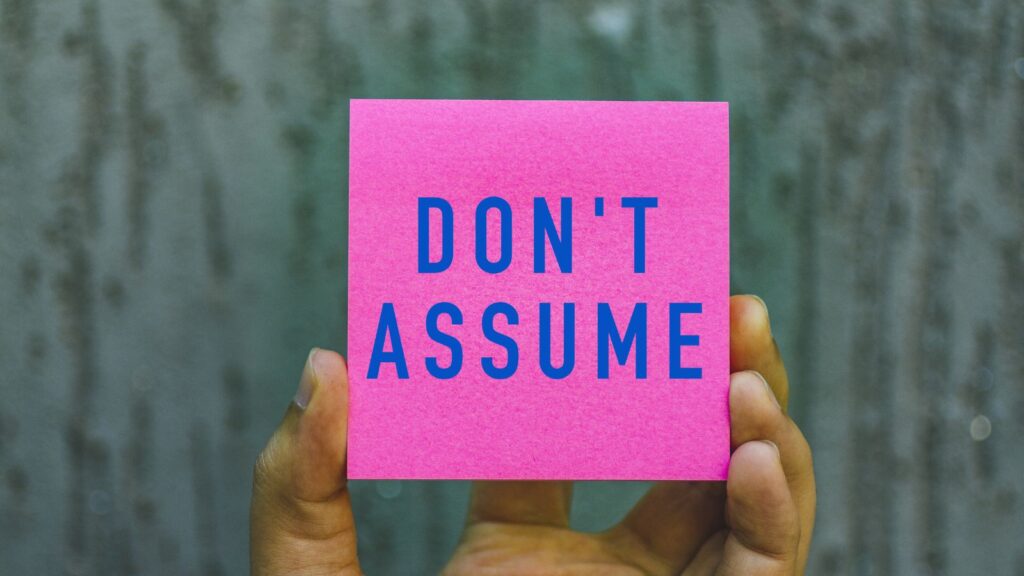In our daily interactions, it's easy to think we're showing respect, but sometimes, our actions or words may unintentionally be disrespectful. Understanding these subtle behaviors can help you cultivate more positive and respectful relationships with those around you.
Not Giving Your Full Attention

When you're distracted during a conversation, whether by your phone, other people, or your thoughts, you're not giving the person speaking your full attention. Not paying attention can make them feel unimportant or undervalued. Research shows that active listening is crucial for effective communication. So, give it your all when people are talking.
Interrupting Others

Interrupting someone while they're speaking can be perceived as disrespectful, even if you're enthusiastic or trying to contribute. When you interrupt, it suggests that what you have to say is more important than what they're saying. Being mindful of letting others finish their thoughts shows respect for their perspective.
Using Your Phone During Interactions

Checking your phone or texting while someone is talking to you sends a message that they don't have your full attention. It can make them feel unimportant and disrupt the flow of conversation. Setting aside your phone shows respect and attentiveness to the person you're with.
Ignoring Personal Boundaries

Respecting personal space and boundaries is crucial for showing respect. Invading someone's personal space or touching them without consent can make them uncomfortable and feel disrespected. Being aware of and respecting personal boundaries demonstrates consideration for others' comfort.
Not Acknowledging Others

Failing to greet or acknowledge someone, especially in social situations, can come across as dismissive or rude. Taking a moment to say hello or simply acknowledging someone shows basic respect and recognition of the other person's presence. It also makes them feel included.
Making Assumptions

Assuming things about others based on stereotypes or limited information can lead to disrespectful behavior. It's important to approach each person as an individual with unique experiences and perspectives. Avoiding assumptions fosters a more respectful and inclusive environment rather than labeling people you don't know.
Being Late or Disorganized

Consistently being late or disorganized can show a lack of respect for others' time and schedules. It implies that your time is more valuable than theirs. Making an effort to be punctual and organized demonstrates respect for others' time and commitments. When you are consistently late, it is just rude.
Not Following Through on Commitments

Making promises or commitments and then not following through can be disrespectful and hurt someone's sense of trust. Whether it's at work, with friends, or in a relationship, honoring your commitments shows reliability and respect for others' expectations.
Using Offensive Language

Using derogatory language or slurs, even if not directed at someone, directly, can create an atmosphere of disrespect. It can also make others feel unwelcome and uncomfortable. Choosing inclusive and respectful language contributes to a more positive and respectful environment for everyone.
Not Offering Help When Needed

Ignoring or failing to offer help when someone clearly needs it can be seen as indifferent or uncaring. Offering assistance shows empathy and consideration for others' well-being. Even small gestures of help can go a long way in showing respect and support.
Dismissing Others' Opinions

Dismissing or belittling someone's opinions or ideas, even unintentionally, can convey disrespect. Everyone deserves to be heard and respected for their contributions. Valuing diverse perspectives fosters a more inclusive and respectful conversation with others.
Being Patronizing or Condescending

Talking down to someone or assuming a superior attitude can be deeply disrespectful. It undermines the other person's confidence and dignity. Treating others as equals and showing genuine respect for their capabilities is essential in all interactions.
Not Apologizing When You're Wrong

Failing to apologize when you've made a mistake or hurt someone shows a lack of accountability and respect. A sincere apology acknowledges the impact of your actions and demonstrates humility and respect for the other person's feelings. When you do something wrong, even if you don't mean to, accept responsibility for it.
Talking Over Others

Speaking over someone else while they're expressing themselves can be seen as disrespectful and dismissive. It suggests that what you have to say is more important than what they are saying. Practicing active listening and allowing others to finish their thoughts shows respect for their perspective to ensure that you aren't being unwittingly disrespectful.
Not Acknowledging Someone's Contributions

Failing to recognize or give credit to others for their contributions can make them feel undervalued or unappreciated. Acknowledging and appreciating the efforts and achievements of others demonstrates respect and fosters a positive and supportive environment. It also makes someone feel good.
Ignoring Nonverbal Cues

Disregarding nonverbal cues, such as facial expressions or body language, can lead to misunderstandings and hurt feelings. Paying attention to nonverbal signals shows respect for the other person's emotions and enhances communication.
Excluding Others

Excluding people from conversations or activities, whether intentionally or unintentionally, can be isolating and hurtful. When possible, make an effort to include others and ensure everyone feels welcome to promote diversity and a sense of belonging for everyone.
Being Judgmental

Passing judgment on others without understanding their circumstances or perspectives can be disrespectful. When you respect differences and refrain from hasty judgments it fosters empathy and creates a more tolerant and respectful environment.
Not Showing Gratitude

Failing to express gratitude for acts of kindness can make others feel unappreciated. Always take the time to acknowledge and thank others for their help or support. Your efforts will show respect and reinforce positive behavior.
Respect is Not Always Obvious

Keep in mind that respect is not just about avoiding being rude. It is also about recognizing and valuing the feelings and perspectives of those around you. Making a conscious effort to be respectful in all your interactions can have a profound impact on your personal and professional relationships. It can also create a more positive and harmonious environment for everyone. When you take responsibility for your actions and continuously strive to improve your communication and behavior, you can contribute to a more respectful and inclusive world.
30 Traditional Sayings That Are Now Considered Offensive by Woke Culture

30 Traditional Sayings That Are Now Considered Offensive by Woke Culture
21 Habits Often Associated With Having a Lower Social Status

21 Habits Often Associated With Having a Lower Social Status
25 Social Issues Gen Z are Determined to Cancel

